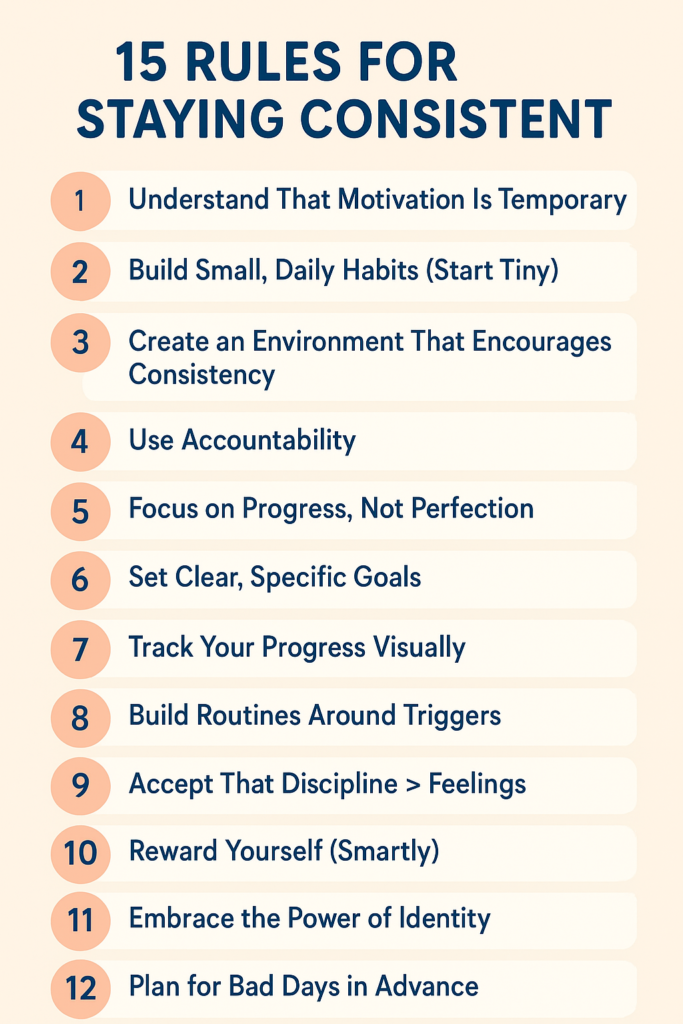How to Stay Consistent (Even When You Don’t Feel Like It)
Consistency is one of the hardest skills to master—but it’s also the secret ingredient behind success in academics, fitness, career, and even relationships. Most people know what they should do, but struggle to show up every single day, especially when motivation disappears. The truth is: consistency doesn’t come from motivation. It comes from habits, systems, and discipline.
In this guide, we’ll break down practical strategies, mindset shifts, and real-life hacks to help you stay consistent even when you don’t feel like it.

1. Understand That Motivation Is Temporary
The biggest mistake students (and even adults) make is relying on motivation. Motivation is a feeling, and feelings are temporary. One day you’ll feel like studying, another day you won’t. If your habits depend on feelings, your results will always be inconsistent.
Instead of waiting for motivation, build systems and routines. A system ensures that even when you don’t feel like it, you still take action because the structure is already in place.
Example: Instead of saying, “I’ll study when I feel like it,” set a fixed schedule (like 7–9 PM daily). Whether you feel inspired or not, you sit at your desk. Over time, your brain associates that time slot with studying automatically.
2. Build Small, Daily Habits (Start Tiny)
Consistency is easier when tasks feel small and doable. Instead of aiming to study for 3 hours a day right away, start with 15 minutes. Once the action becomes a habit, you can gradually increase it.
The “two-minute rule” is a powerful hack: make the habit so small it takes only two minutes to start. Reading one page, opening your notebook, or putting on workout clothes. Starting is the hardest part—once you begin, momentum takes over.
3. Create an Environment That Encourages Consistency
Your environment shapes your behavior more than you realize. If your study desk is messy and full of distractions, staying consistent will be harder.
- Keep your study space clean and minimal.
- Use productivity apps that block social media during study hours.
- Surround yourself with people who support your goals.
Pro Tip: If you want to read more, place a book on your desk. If you want to eat healthier, keep fruits in sight and hide junk food. Your environment should make the right thing easier and the wrong thing harder.
4. Use Accountability
Consistency is easier when someone is watching. Humans are social beings, and we naturally don’t want to let others down.
- Find an accountability partner (a friend who studies or works out with you).
- Join online communities or study groups.
- Share your goals publicly—when people know, you’ll push yourself harder to follow through.
Even apps like Habitica (which gamifies habits) or Notion templates with habit trackers can give you a sense of accountability.
5. Focus on Progress, Not Perfection
Many students quit because they miss one day or break the streak. But consistency isn’t about being perfect—it’s about getting back on track quickly.
If you miss one study session, don’t wait until next week to restart. Continue the next day. A missed day won’t ruin your progress, but giving up completely will.
Consistency means choosing progress over excuses. Even on bad days, doing something small keeps the momentum alive.
6. Set Clear, Specific Goals
Vague goals like “I want to study more” or “I want to exercise regularly” don’t work. Be specific.
- Instead of “study more,” say: “I’ll review my math notes for 30 minutes every evening at 7 PM.”
- Instead of “eat healthier,” say: “I’ll prepare one home-cooked meal every day.”
Clear goals are measurable and easier to track, which makes consistency more natural.
7. Track Your Progress Visually
Our brains love rewards, and seeing progress keeps us consistent. Use habit trackers, calendars, or apps to mark every time you complete your task.
- Use a physical wall calendar and put an “X” on every successful day. The longer the streak, the more motivated you’ll feel to continue.
- Digital apps like Notion, Habit Tracker, or Google Sheets work perfectly for students who prefer online organization.
The trick is simple: don’t break the chain. Even when you feel lazy, do something small to keep the streak alive.
8. Build Routines Around Triggers
Habits stick better when linked to an existing routine. This is called “habit stacking.”
- After brushing your teeth in the morning → write 3 things you’re grateful for.
- After dinner → review class notes for 15 minutes.
- Before bed → plan tomorrow’s to-do list.
By attaching habits to something you already do daily, consistency feels natural instead of forced.
9. Accept That Discipline > Feelings
The truth about consistency? It often feels boring. You won’t always be excited to wake up early, study, or exercise. That’s normal.
Discipline is doing what needs to be done even when you don’t feel like it. The most successful students and professionals rely on discipline, not fleeting motivation.
Shift your mindset: stop asking, “Do I feel like it?” Instead, ask: “Is this aligned with my goals?” If yes, do it anyway.
10. Reward Yourself (Smartly)
Consistency doesn’t mean you have to be strict 24/7. Rewarding yourself helps your brain associate good feelings with habits.
- After completing a study session → take a 10-minute walk or enjoy a snack.
- After a week of consistency → treat yourself to a fun activity.
Rewards reinforce positive behavior and keep you motivated long term. Just make sure your reward doesn’t undo your progress (e.g., don’t eat a whole cake after one workout).
11. Embrace the Power of Identity
Ask yourself: Who do I want to become?
If your goal is to study consistently, shift your identity from “I’m trying to be a good student” to “I am the kind of person who studies daily.”
Identity-based habits are stronger because they connect to your self-image. Every time you act consistently, you cast a vote for the person you want to become.
Example: Instead of saying “I’m trying to write,” say: “I am a writer.” Even a single paragraph a day proves that identity true.
12. Plan for Bad Days in Advance
Life isn’t perfect—you’ll have sick days, emergencies, or moments when energy is low. Instead of quitting, plan backup versions of your habits.
- Normal habit: 30-minute workout.
- Backup habit: 5 push-ups.
- Normal habit: 1-hour study session.
- Backup habit: Review notes for 5 minutes.
This way, you never fully skip. You keep the identity alive, even with minimal effort.
13. Remove Decision Fatigue
Every time you ask yourself “Should I study now or later?” you waste willpower. That’s why routines matter.
Make consistency automatic:
- Fix a specific study time.
- Prepare your clothes the night before.
- Meal prep for the week.
By reducing decisions, you make following through much easier.
14. Find Your “Why”
Consistency feels easier when your goal connects to something meaningful. Ask yourself: Why do I want this?
- Study consistently → because you want to graduate and get your dream job.
- Exercise daily → because you want long-term health and energy.
When the “why” is powerful, even tough days won’t break your consistency.
15. Practice Patience (Consistency = Compounding)
Consistency doesn’t give instant results. You won’t see abs after 2 workouts or higher grades after one week of studying. But the compound effect is real.
Small actions, repeated daily, multiply into massive results over months and years. Trust the process. Consistency is about playing the long game.
Final Thoughts
Staying consistent isn’t about being perfect—it’s about showing up, even when you don’t feel like it. Motivation fades, but systems, habits, and discipline keep you moving. Start small, track your progress, and remember that every tiny action is a step toward the person you want to become.
If you apply even a few of these strategies, you’ll notice a huge difference in your ability to stick with your goals. Start buddy. You can do it!



